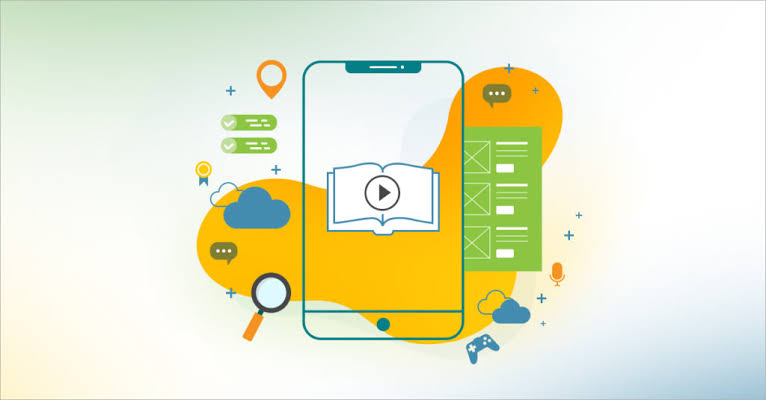
Top Educational Apps That Boost Learning and Academic Performance
Educational apps are transforming the way students learn, revise, and collaborate. From gamified tools like Duolingo and Quizlet to structured platforms like Khan Academy, Google Classroom, and Coursera, these apps enhance engagement and accessibility. Byju’s and Photomath offer personalized support, while Udemy and Brainly broaden learning horizons.
✨ Raghav Jain

Introduction
In today’s digital age, education is no longer confined to classrooms and heavy textbooks. With just a smartphone or tablet, students can access a world of knowledge, interactive lessons, and skill-building activities. Educational apps have become game-changers, making learning more engaging, personalized, and accessible for learners of all ages.
From solving math problems with step-by-step guidance to improving language skills or preparing for exams, these apps are designed to boost academic performance while keeping learning enjoyable. But with thousands of apps available, which ones actually work?
In this article, we’ll explore the top educational apps that enhance learning, the science behind why they’re effective, practical ways to use them daily, and how to avoid common mistakes when relying on digital learning tools. In today’s fast-paced digital era, education has transformed beyond the walls of traditional classrooms. Technology has become an integral part of learning, and with the increasing use of smartphones, tablets, and the internet, educational apps have emerged as powerful tools to enhance academic performance. These apps not only make learning more interactive and engaging but also provide students with flexibility, personalized resources, and instant access to knowledge. They cater to different age groups, subjects, and learning styles, helping students and even educators adapt to the evolving demands of modern education. The following exploration highlights some of the top educational apps that have been widely recognized for boosting learning efficiency and academic success.
One of the most popular and trusted apps in the education sector is Duolingo. Designed primarily for language learning, Duolingo makes mastering a new language both fun and effective. The app uses gamification techniques such as streaks, rewards, and levels, which encourage consistency and motivate learners to keep progressing. With over 30 languages available, students can practice vocabulary, grammar, and pronunciation in short lessons that fit easily into daily routines. This accessibility helps learners build fluency and develop cross-cultural communication skills, which are increasingly valuable in both academic and professional settings.
Another app that significantly improves academic performance is Khan Academy. Known for its extensive library of lessons, Khan Academy covers a wide range of subjects including mathematics, science, history, economics, and more. The app offers bite-sized video tutorials paired with practice exercises, which allow learners to reinforce concepts at their own pace. Students struggling with complex topics can revisit the material multiple times, while advanced learners can explore higher-level courses for enrichment. Teachers also benefit from Khan Academy by assigning lessons, tracking progress, and identifying areas where students need more attention. By offering free, high-quality educational content, Khan Academy has become a reliable companion for learners worldwide.
When it comes to mastering productivity and note-taking, Evernote stands out as a powerful educational tool. While not a direct subject-teaching app, Evernote plays a vital role in organizing academic materials, creating study notes, and managing tasks efficiently. Students can save lecture notes, research material, and to-do lists in one place, ensuring they stay on top of their assignments and exam preparations. The ability to sync across devices means learners can access their notes anytime and anywhere. By fostering better organization and time management, Evernote indirectly enhances academic performance and supports long-term learning goals.
Quizlet is another widely recognized app that has transformed the way students prepare for exams. It enables learners to create digital flashcards, quizzes, and study sets on any subject. The app also provides pre-existing study materials created by other users, making it easier to revise topics quickly. Quizlet uses features like spaced repetition and memory-based games to help students retain information more effectively. Whether for vocabulary memorization, history dates, or scientific terms, Quizlet’s interactive learning approach reduces monotony and boosts confidence before exams.
For mathematics enthusiasts and students who often struggle with complex problems, Photomath has become an indispensable app. This innovative tool allows learners to take a picture of a math problem, and the app instantly provides step-by-step solutions. Beyond just giving answers, Photomath explains the process, ensuring that students understand the logic and method behind each problem. This fosters a deeper comprehension of mathematical concepts rather than relying solely on memorization. As math often forms the backbone of academic success in numerous fields, apps like Photomath empower students to overcome challenges and strengthen problem-solving skills.
Google Classroom has also made a huge impact in academic environments, especially in recent years when online and hybrid learning became essential. The app acts as a virtual classroom where teachers can assign tasks, share resources, and provide feedback. Students can submit assignments digitally, participate in discussions, and stay updated on class schedules, reducing the hassle of paperwork and miscommunication. With seamless integration with other Google tools such as Docs, Drive, and Meet, Google Classroom simplifies collaboration and creates an organized learning environment. By bridging the gap between teachers and students, it enhances engagement and makes learning more accessible.
Another app that is gaining attention for its unique approach is Coursera. This platform connects students with top universities and institutions around the world, offering courses on a wide range of academic and professional topics. Students can pursue courses in business, computer science, psychology, arts, and more, with many providing certificates upon completion. Coursera not only enhances subject knowledge but also helps learners build practical skills relevant to their careers. By bridging traditional education with real-world expertise, it supports lifelong learning and academic growth.
Brainly is an app that fosters collaborative learning by allowing students to ask and answer academic questions within a global community. Often referred to as a peer-to-peer learning platform, Brainly provides solutions, explanations, and guidance across multiple subjects. This interactive format encourages students to help each other, exchange ideas, and strengthen their knowledge base. By promoting collaboration and peer support, Brainly builds confidence and helps students view learning as a shared experience rather than a solitary task.
Lastly, Edmodo deserves a mention as it creates a safe and interactive space for students, teachers, and even parents to collaborate. Similar to social media platforms but designed for education, Edmodo allows teachers to share resources, conduct quizzes, and monitor progress, while parents can remain involved in their child’s academic journey. This holistic approach ensures that learning is not limited to textbooks but becomes a well-rounded, communicative process involving all stakeholders in education.
In conclusion, the rise of educational apps has revolutionized the way students learn and perform academically. From language mastery with Duolingo to subject-specific guidance with Khan Academy and math problem-solving with Photomath, each app contributes uniquely to the learning ecosystem. Apps like Evernote and Google Classroom enhance organization and communication, while platforms such as Coursera and Brainly broaden opportunities for collaborative and lifelong learning. The true strength of these apps lies in their ability to make learning flexible, interactive, and personalized. As technology continues to advance, the role of educational apps in boosting academic performance will only grow stronger, empowering learners to achieve excellence in an increasingly competitive world.
Why Educational Apps Matter in Modern Learning
- Personalized Learning
- Apps adapt to a student’s pace, strengths, and weaknesses, offering tailored lessons.
- Interactive & Fun
- Gamified quizzes, videos, and animations make studying exciting rather than boring.
- Flexibility & Accessibility
- Students can learn anytime, anywhere—whether during travel, breaks, or late-night study sessions.
- Instant Feedback
- Unlike traditional learning, apps provide immediate answers, progress reports, and guidance.
- Skill Development Beyond Academics
- They improve problem-solving, creativity, and time management—skills vital for future careers.
Top Educational Apps for Students
1. Khan Academy
A free app offering lessons on almost every subject—from math and science to history and art.
- Strength: Bite-sized video lectures and practice exercises
- Best For: School and college students wanting clarity on tough subjects
2. Duolingo
Learn languages in a fun, game-like manner.
- Strength: Daily practice streaks, fun quizzes, and speaking exercises
- Best For: Students wanting to improve communication skills or learn a new language
3. Google Classroom
A virtual classroom that connects teachers and students for seamless online learning.
- Strength: Assignment submission, resource sharing, and collaboration
- Best For: Academic performance and classroom coordination
4. Coursera
Offers courses from top universities and institutions worldwide.
- Strength: Certificates, career-focused skills, expert-led classes
- Best For: College students and lifelong learners
5. Byju’s
India’s popular learning app with interactive videos and adaptive practice tests.
- Strength: Concept clarity with animations and engaging teaching
- Best For: School students preparing for exams
6. Quizlet
Flashcards and quizzes to make memorization fun.
- Strength: Easy to revise, test yourself, and collaborate with peers
- Best For: Quick exam prep and retaining key concepts
7. Brainly
A peer-to-peer learning app where students ask and answer homework questions.
- Strength: Community-based solutions and discussions
- Best For: Students struggling with tough assignments
8. EdX
Access courses from universities like Harvard and MIT.
- Strength: Affordable certifications, flexible learning pace
- Best For: Higher education students
9. Udemy
A platform with thousands of affordable courses on academic and skill-based topics.
- Strength: Lifetime access to purchased courses
- Best For: Students and professionals looking for extra skills
10. Photomath
Solves math equations by scanning them with your phone’s camera.
- Strength: Step-by-step solutions, great for tricky math problems
- Best For: Students struggling in mathematics
How Educational Apps Improve Academic Performance
- Better Retention
- Interactive lessons keep students engaged, making it easier to remember concepts.
- Time Management
- Apps with progress trackers and reminders help students stick to study schedules.
- Confidence Building
- Instant feedback boosts confidence and reduces fear of making mistakes.
- Exam Readiness
- Practice tests, quizzes, and flashcards make revision more effective.
- Global Exposure
- Courses from international institutions expose students to new perspectives.
Daily Practices to Make the Most of Educational Apps
Morning
- Spend 10 minutes revising vocabulary on Duolingo or Quizlet.
- Watch a short Khan Academy video on a subject you’ll study in school.
Midday
- Use Photomath or Brainly to solve homework problems.
- Review notes and assignments on Google Classroom.
Evening
- Dedicate 30 minutes to a Coursera, Udemy, or EdX course.
- Revise concepts through Byju’s animated lessons.
Weekly Learning Habits with Apps
- Set a weekly goal (e.g., finish 5 lessons on Khan Academy).
- Attempt at least 2 mock tests on Quizlet or Brainly.
- Dedicate 1 hour to learning a new skill (coding, language, design).
- Track progress every Sunday—see how much time you spent learning.
- Reward yourself for completing weekly learning streaks.
Common Mistakes Students Make with Learning Apps
❌ Using too many apps at once
✅ Stick to 2–3 apps consistently instead of juggling 10.
❌ Passive watching without practice
✅ Always follow videos with exercises or quizzes.
❌ Studying without breaks
✅ Follow the 25-5 rule: 25 minutes study, 5 minutes rest.
❌ Depending only on apps
✅ Use apps as supplements—not replacements—for books and teacher guidance.
Myths About Educational Apps: Busted!
“Educational apps are just a distraction.”
→ False! When used with discipline, they improve focus and efficiency.
“Only paid apps are good.”
→ Not true. Free apps like Khan Academy and Duolingo are highly effective.
“Apps can replace teachers.”
→ Never. Apps support learning but teachers provide mentorship, guidance, and critical thinking.
“Using apps too much damages memory.”
→ Actually, apps improve retention by making study interactive and enjoyable.
“Apps are only for tech-savvy students.”
→ Completely wrong. Most apps are beginner-friendly with simple designs.
Sample Daily Study Flow with Apps
- Morning: Quick Duolingo session + Quizlet flashcards
- Afternoon: Khan Academy or Byju’s lesson before homework
- Evening: Coursera/Udemy course for skill-building
- Night: Revise with Photomath or Brainly before sleep
Conclusion
Educational apps are not just tools—they are bridges connecting students to smarter, faster, and more personalized learning. By combining traditional study methods with these digital platforms, students gain clarity, confidence, and better academic outcomes.
The secret lies in consistency. Using apps daily in small doses is far more effective than cramming once in a while. Whether you’re revising math problems, learning a new language, preparing for exams, or gaining extra skills, there’s an app tailored for your needs.
So, instead of scrolling aimlessly, open an educational app and invest those minutes into your growth. With the right apps and habits, you’re not just learning—you’re preparing yourself for a brighter future.
Start today. Learn smarter. Achieve more.
Q&A Section
Q1:- What is Duolingo and how does it make language learning engaging?
Ans :- Duolingo uses gamified lessons, quizzes, and rewards to simplify language learning. Its bite-sized approach builds vocabulary, grammar, and speaking skills while keeping learners motivated.
Q2:- How does Khan Academy support academic learning for students?
Ans :- Khan Academy offers free video tutorials, practice exercises, and personalized dashboards in subjects like math, science, and humanities, helping learners study at their own pace.
Q3:- Why is Google Classroom important for teachers and students?
Ans :- Google Classroom streamlines assignments, discussions, and grading. It allows teachers to share resources digitally and students to collaborate easily, making education more interactive.
Q4:- How does Quizlet help with memorization and exam preparation?
Ans :- Quizlet provides flashcards, tests, and learning games that strengthen memory retention. Its adaptive study modes prepare students effectively for exams and assessments.
Q5:- What makes Coursera a valuable platform for higher education and skill building?
Ans :- Coursera partners with top universities to deliver online courses, certificates, and degrees, enabling learners to upgrade skills affordably and globally recognized.
Q6:- How does Edmodo enhance communication between teachers, students, and parents?
Ans :- Edmodo acts like a social learning platform, where educators can post updates, assignments, and feedback. Parents stay informed, creating a connected learning environment.
Q7:- What role does Byju’s play in personalized education in India?
Ans :- Byju’s uses animations, interactive videos, and AI-based adaptive learning to simplify complex topics, especially in math and science, enhancing conceptual clarity.
Q8:- How does Photomath help students solve math problems?
Ans :- Photomath scans problems using a phone camera and provides step-by-step solutions, teaching methods alongside answers, and making math more understandable.
Q9:- Why is Udemy popular among learners and professionals?
Ans :- Udemy hosts thousands of affordable courses on academic and professional topics, letting learners choose subjects of interest and learn anytime, anywhere.
Q10:- How does Brainly encourage collaborative learning?
Ans :- Brainly is a peer-to-peer platform where students ask academic questions and get answers from a global community, encouraging shared knowledge and teamwork.
Similar Articles
Find more relatable content in similar Articles

The Future of Social Media Ma..
AI is transforming social med.. Read More

From Classroom to Career: App..
Skill-building apps help stud.. Read More

Smart Study to Smart Career: ..
Smart study and career apps a.. Read More

Top Educational Apps That Boos..
Educational apps are transfor.. Read More
Explore Other Categories
Explore many different categories of articles ranging from Gadgets to Security
Smart Devices, Gear & Innovations
Discover in-depth reviews, hands-on experiences, and expert insights on the newest gadgets—from smartphones to smartwatches, headphones, wearables, and everything in between. Stay ahead with the latest in tech gear
Apps That Power Your World
Explore essential mobile and desktop applications across all platforms. From productivity boosters to creative tools, we cover updates, recommendations, and how-tos to make your digital life easier and more efficient.
Tomorrow's Technology, Today's Insights
Dive into the world of emerging technologies, AI breakthroughs, space tech, robotics, and innovations shaping the future. Stay informed on what's next in the evolution of science and technology.
Protecting You in a Digital Age
Learn how to secure your data, protect your privacy, and understand the latest in online threats. We break down complex cybersecurity topics into practical advice for everyday users and professionals alike.
© 2025 Copyrights by rTechnology. All Rights Reserved.